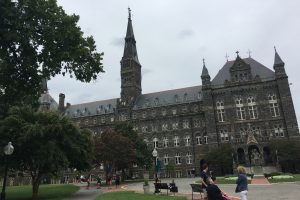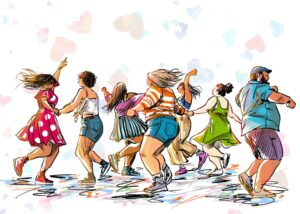My lack of athleticism was never more apparent than a few Saturday nights ago when I gracefully tumbled down the steps of the Lincoln Memorial, bruising my pride and breaking my leg. After a hazy four hours in the ER, SafeRides deposited me—splint cast, crutches, and all—on the curb outside of Henle. That first night, it took me about an hour to get from the curb to my bed, and I got my first taste of what the next few weeks would hold.
I admit that prior to this experience, I hadn’t dedicated thought to the issue of disability access at Georgetown. Sure, I have seen my peers with more obvious ability struggles and thought, “Wow, what a tough campus to navigate,” but I never countenanced the possibility that I could have a disability (albeit temporarily) or that navigating the channels of the administration could be more difficult than navigating campus itself.
For me, trying to use crutches to get to class has been a laughable experience. I go up the flight of stairs in my apartment, down two flights to leave my building, up another set, down a couple steps, down the Darnall elevator—and that’s just the routine to leave Henle. From there, going anywhere is exhausting and painful. The crutches tear the skin on my sides; the pain made me ill my first day going back to class after my accident. I have had to give up on attending my favorite class for the rest of the semester simply because it’s located in Car Barn.
When I emailed my dean the day after I broke my leg to ask about accommodations, the only recommendation my dean gave was to get a motorized scooter, even though I am living in a wheelchair inaccessible building.
In utter disbelief, I followed up with my dean and was told that according to the not just him, but also both the Academic Resource Center and Disability Support Services, my best option—and the only option even for students living in ADA inaccessible housing like Village A, Village B, Henle, and university townhouses—was to obtain a wheelchair.
I was given no options for housing, no options for transportation, and no protocol for dealing with a temporary disability. When I asked if I could just get a ride in a golf cart from outside Henle to my classes, I was told that allowing students to ride in golf carts would be a liability.
This denial of such a simple request, in addition to the lack of support I received, blew my mind. Though I understand why having injured students in the golf carts could be a liability, I have to wonder: has this situation honestly never arisen before? Did the university purchase those golf carts, used to shuttle around the aged Jesuits and help maintenance workers, and really not think that one day there would be an injured athlete or student who might need to use one?
Given the number of the dormitories on campus that are not ADA accessible, the extensive construction that makes traversing the Hilltop even more difficult than it already is, and the great likelihood that another student might be put in a similar situation as me, it seems ridiculous that the university hasn’t invested the time and energy into contacting their insurance carrier or legal department about covering that liability, or developing any sort of protocol to help students attend their classes when they have trouble getting around.
When my circumstances changed because of an accident for which there is nothing to blame besides my bad luck, Georgetown’s promises of cura personalis went out the window. Hiding behind bare-minimum legal requirements and shrugging at their own utter lack of forethought does not qualify as “caring for the whole person.” In fact, it falls woefully short.
I do not pretend to understand the struggle of navigating this campus with a permanent or far more serious disability. But if my experience has given me any insight into the bureaucratic nightmare of receiving accommodations, then Georgetown needs to drastically improve the services available to students of every type of ability.
As Disability Support Services is more than happy to point out on their website, the law does not require Georgetown to provide transportation services for students with temporary disabilities, but Georgetown needs to hold itself to something higher than that pathetically low standard. Among the many issues on this campus for which there seem to be no right solutions—inadequate student club funding, the development of a satisfactory campus plan, balancing housing to make students and local residents happy—I feel that this is one small instance where there’s an easier answer. Georgetown’s administration has the ability to put concerted effort into making legitimate adjustments to its accommodation policies—for $60,000 a year, the administration can go the extra mile and make Georgetown work for us.







I completely agree. I graduated in May 2014, and only a few months later, I broke my right ankle in an open double-fracture (plus a single break on my left foot). I was in the hospital for a week after surgery, confined to my apartment for 2 months, and then in a wheelchair/walker for another month, and then on crutches for months, and only now have graduated to partial use of a walking boot. I remember early on, right after going home, thinking that I was absurdly grateful to have broken everything AFTER graduating, because I realized there was no way I would have been able to graduate on time had the break happened before May. I did not venture on campus to see any remaining friends for months due to how inaccessible everything is — the buildings, sure, but also just simply the roads and sidewalks – especially now with construction. So sorry to hear what you went through. You should use your position to advocate strongly for change – since my injury happened after graduation, I could not be the origin for such advocacy, but I’d be more than happy to provide some alum support. It’s absolutely awful that Georgetown does not provide enough support for its disabled (even if only temporarily) students.
As a parent, I was deeply saddened by the university’s response to our family’s needs. The unwillingness to make even temporary accommodations to simply assist getting to and from classes was disappointing to say the least. For a university in which we have invested so much, whose core educational mission is cura personalis, and in whom we have trusted with the care and education of our daughter, I would have expected a more holistic approach to achieving that mission to include physical needs.
As an alumna and current staff member who has planned many campus events, it is personally and professionally embarrassing—not to mention unethical—that Georgetown cannot accommodate many of our community members and guests with disabilities.
I broke my knee while at Georgetown and was left to my own devices hobbling on crutches. I got 0 help from the administration! On one occasion, a passing maintenance worker in a golf cart took pity on me and offered me a lift to Car Barn. When we arrived, his supervisor saw me getting out and stormed over to yell at him. It’s really quite ridiculous.